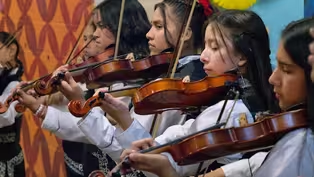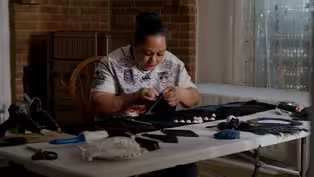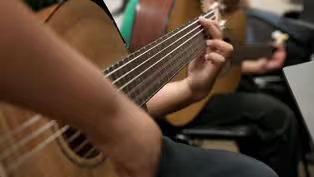
Honey Teahive
Clip: Season 4 Episode 2 | 8m 1sVideo has Closed Captions
Join this Utah business owner as she shares her love for the art of afternoon tea.
Honey Teahive is a unique company founded by Mika Lee to deliver afternoon tea parties and custom desserts to your Utah doorstep. Clients celebrate birthdays, bridal showers, and team building activities with a 3-course meal with tea pairings. Mika’s love of British afternoon tea has led her to indulge in this tradition throughout her worldwide travels and through teaching those around her.
Problems playing video? | Closed Captioning Feedback
Problems playing video? | Closed Captioning Feedback
This Is Utah is a local public television program presented by PBS Utah
Funding for This Is Utah is provided by the Willard L. Eccles Foundation and the Lawrence T. & Janet T. Dee Foundation, and the contributing members of PBS Utah.

Honey Teahive
Clip: Season 4 Episode 2 | 8m 1sVideo has Closed Captions
Honey Teahive is a unique company founded by Mika Lee to deliver afternoon tea parties and custom desserts to your Utah doorstep. Clients celebrate birthdays, bridal showers, and team building activities with a 3-course meal with tea pairings. Mika’s love of British afternoon tea has led her to indulge in this tradition throughout her worldwide travels and through teaching those around her.
Problems playing video? | Closed Captioning Feedback
How to Watch This Is Utah
This Is Utah is available to stream on pbs.org and the free PBS App, available on iPhone, Apple TV, Android TV, Android smartphones, Amazon Fire TV, Amazon Fire Tablet, Roku, Samsung Smart TV, and Vizio.

This is Utah
Liz Adeola travels across the state discovering new and unique experiences, landmarks, cultures, and people. We are traveling around the state to tell YOUR stories. Who knows, we might be in your community next!Providing Support for PBS.org
Learn Moreabout PBS online sponsorship- How do you take your tea?
If the first answer that comes to mind is, "I don't," I get it.
I understand there's a valid reason for that bitter taste you probably hate, but there's also a valid reason why the art of afternoon tea is spreading like honey here in Utah.
(egg hitting counter) (classical music) - I have a tendency to move a little bit faster than the average person.
(whisk clicking) I'm self-taught, I'm a self-taught baker and chef.
I very rarely make the same menu twice.
That's kind of how I am, just like experimental, you know?
Just try it out, see if it works.
If you like it, if that's the direction you wanna go, keep going.
My name is Mika Lee and I am the owner and founder of Honey Teahive.
I've got a little, like a miniature tea party for you.
I've made some finger sandwiches.
We've got a roasted red pepper goat cheese sandwich, some vanilla English scones.
You know, from a girl who was born and raised in Salt Lake City, the quintessential afternoon tea place was the Grand America.
(upbeat jazzy music) And I do remember going in high school being like, wow, this is like an experience with food.
- I had a friend who worked at the Grand America and she was part of the tea service.
So I was able to kind of experience that and see more from behind the scenes side of it.
It was something I was really struck by, the care, the detail.
- [Mika] They bring everything out at once so you've got three courses, you've got the sandwiches the scones, and then the desserts.
Etiquette wise, you're supposed to start from the bottom tier and kind of make your way up.
It was eating with your eyes first before you ate the food.
- Typically, when entrepreneurs come to us, they have an idea, they have the skills.
It's a number of people who already have been cooking for years.
So with the Spice Kitchen, we work a lot with refugees, immigrants, asylees, but we also work with low to moderate income populations who are native born.
So that would be the case of Mika.
- What really drew me to opening an afternoon tea party business was the tea.
We're missing out in America.
Tea is really undervalued, and tea is the second most popular drink in the world.
This is a black tea.
- The tea smells so good.
I think we should try some.
- Let's drink some.
- Before it gets too cold.
(classical music) - The water is really important because tea has two ingredients, tea leaves, and water.
I like to use more like filtered water.
It's more neutral so that that when you are drinking whatever leaves you get more of the taste.
The temperature of the water is extremely important.
A black tea is recommended to be 200 plus degrees or boiling.
You could potentially burn tea leaves.
So if you're doing something very delicate like white leaves or green leaves, and you put them in boiling water it's gonna really draw out a lot more of that bitterness.
- I saw a video that went viral.
People in London and Europe calling out Americans for making tea in the microwave.
(women laughing) - If you leave black tea in water for an extended period of time you'll notice the bitterness and that bitterness is almost like tannins when you're drinking wine.
But some people love it.
Some people, especially people are a little bit newer to tea, are very sensitive to it.
And I didn't necessarily know how to present tea to Utahns because it's so like, "Oh, I don't like tea."
You know?
Or, "It's got caffeine and we can't drink that."
And so I thought, okay, I'm entering a market where it's gonna be a little bit difficult for me to share what I know with people and I've been drinking tea since I was 10, and my family, who's from Taiwan, I think they know a little bit more about tea than the average person.
Even in Taiwan.
Drinking tea is not something that you just do on your own.
It's almost always with company, depending on who's serving, sometimes you've got these little cups that you refill frequently and it's more of, you know, I'm serving you, I'm giving you something you know, you're welcome here.
It's that gesture that means a little bit more than what is in that little cup.
- I appreciate you.
- You're welcome.
- Have a good one.
Take care.
If we wanted to like create like a community.
Hello!
Of people who love afternoon tea, especially in Utah, maybe we can create something like the Hive where we have Queen Bees who participate and host different tea parties.
Because of the pandemic, I started to do the Tea Party boxes.
I started my business just before pandemic, it kind of manifested after I realized that everyone is saying, "Don't gather, don't socialize."
It made me feel like I was able to like connect with people in like this very dark pandemic time - With a small business, they really rely on the support of the community.
Starting a food business is really hard.
I ran one myself.
Margins are very thin.
I don't think people necessarily understand all of the costs involved.
- I was born and raised in Utah, even though English wasn't necessarily my first language, it was very close second.
So for someone who might have like a language barrier, I can only imagine how difficult it is.
I will contribute a lot of my success and resiliency to Spice Kitchen because they're helping me with that business side.
Okay, well you're gonna love this one.
- I cannot wait.
This like, everything on this looks so amazing already.
I cannot wait.
- I think my parents didn't believe me that I was going to start a food business because they were like, oh, you know this, this girl she's got a master's degree in healthcare.
Like, why would she start a food business?
I think my mom was actually a little bit concerned.
My parents, they immigrated from Taiwan and my mom had owned an ice cream shop when we were growing up, and I remember her, it being very hard.
So I think she was really more worried about me, but I think after she realized that I could create something and that people really liked what I was creating, she's like, "Okay, she's not crazy."
You know, like trying to do this, this weird thing that nobody knows about.
I think that her love language kind of translated over to my love language.
We find a lot of happiness in feeding people.
(classical music) When I'm making the things and it takes a labor of love.
So it's more repetitive.
I'm cutting scones or like I'm hand mixing something, I'm really thinking if I were the customer, like how would I want this to look or how would I want this to taste?
You know?
It's just like the small things that I feel like would make their experiences better.
It's that labor of love, right?
Who really wants to mix scones by hand, right?
It's not easy and I like to think that I create some interesting flavors too, so hopefully that people try my things because it's a little bit more experimental and something different than what they've had in their normal palette.
It just brings me so much joy because you see this whole nother world open up for them.
Preview: S4 Ep2 | 30s | The power of cultural traditions can unite people and spark transformative change. (30s)
Video has Closed Captions
Clip: S4 Ep2 | 6m 58s | This fashion designer creates Pacific-Island-inspired designs to celebrate her heritage. (6m 58s)
Teaching Mariachi – Los Mariachitos
Video has Closed Captions
Clip: S4 Ep2 | 8m 24s | This musician shares a love of music and his culture with a new generation of students. (8m 24s)
Providing Support for PBS.org
Learn Moreabout PBS online sponsorshipSupport for PBS provided by:
This Is Utah is a local public television program presented by PBS Utah
Funding for This Is Utah is provided by the Willard L. Eccles Foundation and the Lawrence T. & Janet T. Dee Foundation, and the contributing members of PBS Utah.


















